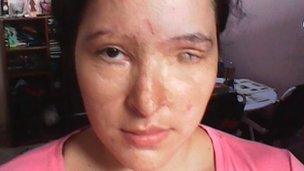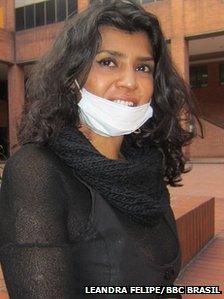Colombia acid victims seek justice as attacks spread
- Published

Viviana Hernandez says some victims are afraid to report the crime
"All of a sudden you see some liquid coming towards your face and you think that somebody might have slipped, or that they want to get you wet," says Viviana Hernandez.
The 28-year-old Colombian recalls vividly the acid attack five years ago that left her with burns to her face, chest and hands, and cost her the use of her left eye.
"You never imagine that it can happen to you."
Acid-throwing is more usually associated with violence against women in countries such as Bangladesh or Pakistan, but current trends suggest the risk of women being disfigured and blighted by acid might actually be higher in Colombia.
The Colombian Institute of Legal Medicine registered 55 such attacks in 2010 and 42 in 2011.
A further 22 acid attacks have been reported so far this year.
According to Ms Hernandez, who belongs to a local acid-survivors group, the real number is much higher.
"We know of many cases that were never reported because of threats, because of fear," she told the BBC.
"Since the year began, there have been more than 100 cases. There are women burned with acid across the country."
By comparison, it is estimated that more than 150 women have acid thrown on them every year in Pakistan, whose population is nearly four times that of Colombia.
And according to the Dhaka-based Acid Survivors Foundation, Bangladesh, which has a population of 165 million compared with Colombia's 47 million, saw 84 attacks in 2011.
Hired attackers
Colombia's armed groups involved in the long-running internal conflict have never hesitated to resort to sexual violence as a mechanism to control or punish the population.
But the country is just starting to come to terms with the problem of acid attacks as a particularly insidious form of gender-based violence.
"The aim is to harm, not to kill. And to harm somebody for the rest of her life," said Ms Hernandez, who blames her former husband for her plight.
"He wanted us to get back together but I refused. So he used to call me, to threaten me. On the day of the attack he followed me."
Her husband did not throw the acid himself, she said, but pointed her out to hired attackers.
Gina Potes was attacked in her home 15 years ago.
"When they threw acid at me they also told me: 'It is your fault for being so pretty'," she told the BBC.
"So I think the main reason (for the attack) was envy, jealousy."
To this day, the 35-yeara-old former beautician does not know who assaulted her.
The acid attack on Ms Potes, if not the first, was relatively rare until a few years ago.
More recently, the authorities have also seen a rise in muggings where acid is used as a weapon.
Acid attacks on two young children have given further cause for concern.
Neither Ms Potes nor Ms Hernandez has seen her attacker prosecuted, much less jailed.
Fit punishment
The turning point for Ms Potes was eight months ago when she saw another assailant go unpunished. That is when she decided to set up the survivors' group.
"The truth is you always report the crime and nothing ever happens," she said, citing impunity as one of the main reasons why acid attacks are on the rise.

Gina Potes has undergone some 35 operations since being attacked
Ms Potes is convinced that the real scale of the problem would never have come to light if she had not decided to speak out.
But she also blames the Colombian media.
"They don't try to educate people, they only care about sensationalism and don't think about the consequences of how they deliver the news," she told the BBC.
"They might be talking about how disfigured women are fighting because there is no justice, and right away they explain how people can get hold of acid... for only 2,000 pesos ($1/70p).
"And so every time an attack is reported on the news you can tell there will be another one a few days later," she said.
Changing the way the issue is portrayed in the media is, therefore, one of the aims of the group.
But they are also fighting for better medical care and work opportunities for acid survivors, as well as for a reform of the penal code.
Under current Colombian legislation, dousing a woman in acid is a "personal attack", a crime punishable with a maximum of 10 years in prison but one that qualifies for parole.
That is a far cry from the punishment victims believe is needed to deter them.
- Published21 September 2011
- Published19 April 2012
- Published17 January 2011